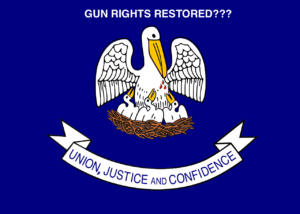 Figuring out whether you can have your gun rights restored after you’ve been convicted for a felony is tricky. The below information is intended to help you determine whether you may be eligible to possess a gun in Louisiana. Of course, you will always want to check with a licensed attorney if you are unsure.
Figuring out whether you can have your gun rights restored after you’ve been convicted for a felony is tricky. The below information is intended to help you determine whether you may be eligible to possess a gun in Louisiana. Of course, you will always want to check with a licensed attorney if you are unsure.
The reason that determining gun rights is difficult in Louisiana is because state law and federal law say different things. This post will start first with Louisiana law, explain the federal law, and then talk about how Louisiana and federal law work together.
Louisiana State Law on Restoring a Felon’s Gun Rights
La. R.S. 14:95.1 prohibits possession of a firearm by someone convicted of a felony offense of a crime of violence, a felony violation of the Controlled Dangerous Substances Act, or any offense defined as a sex offense. Crimes of violence are defined in La. R.S. 14:2(B). The Controlled Dangerous Substances Act prohibits possession and distribution of any illegal narcotic, including marijuana, heroin, methamphetamine, cocaine, and prescription drugs without a prescription. Sex offenses are defined in La. R.S. 15:541(24)(a). If you are convicted of one of these felony offenses, then you are not allowed to possess a gun in Louisiana for at least 10 years after the conviction.
However, once 10 years pass after you complete your sentence, including any probation and parole requirements, it is not a criminal offense to possess a gun under Louisiana state law. This means that 10 years after you are “off paper” for a felony offense barring gun possession in Louisiana, you could possess a gun without being in trouble under Louisiana law. Of course, this does not mean that you would be able to possess a gun without getting into trouble under federal law.
Federal Law on Restoring a Felon’s Gun Rights
The Gun Control Act, 18 U.S.C. 922(g),(n),(d), prohibits the possession of a firearm by a person convicted in any court of “a crime punishable by imprisonment for a term exceeding one year.” 18 U.S.C. 921(g)-(h). Unlike Louisiana law, there is no time period after which gun rights are automatically restored, and this rule applies to all types of felonies if the offense is punishable by a term of more than one year. Note that you do not actually need to receive a sentence of more than one year for this rule to apply. The federal rule applies if you could have received a sentence of more than one year.
However, a conviction that has been expunged, set aside, or for which a person has been pardoned or had civil rights restored does not count as a conviction under federal law unless the pardon, expungement, or restoration expressly provides that a person may not possess a firearm. 18 U.S.C. 921(a)(20). (This is referred to as the “unless clause.”)
Courts have held that the “unless clause” means that an individual prohibited from possessing one type of gun under state law is prohibited from possessing any firearm under federal law. See Caron v. United States, 524 U.S. 308, 314-16 (1998). The Supreme Court of the United States found that a person could be punished under federal law for possessing a shotgun even though state law only prohibited that person from possessing a handgun. Caron, 524 U.S. at 314-16. Because the person could not possess all types of guns under state law, the person could possess no guns under federal law.
This has been interpreted to mean that a person who cannot legally obtain a concealed carry permit under Louisiana law will violate federal law if they possess any type of firearm. See, e.g., Axton v. United States Dep’t of Justice, No. 16-5419, 2016 WL 4496765 (E.D. La. Aug. 26, 2016).
Therefore, full restoration of gun rights under state and federal law in Louisiana requires that a person is eligible again for a Louisiana concealed carry permit. This is because if you are not allowed to carry concealed guns, federal law says you cannot carry any guns at all.
La. R.S. 40:1379.3(C) lists the requirements to be eligible for a concealed carry permit. Paragraphs (C)(6) and (C)(10) provide that a person convicted of a felony offense becomes eligible for a concealed carry permit if (a) 10 years have passed since the completion of the suspended sentence, probation, or parole, and (b) the conviction is expunged. A person is never eligible if convicted of a crime of violence.
The Bottom Line
In conclusion, gun rights can be restored in Louisiana under state and federal law after a felony conviction as long as (1) the conviction is not for a crime of violence, (2) 10 years have passed since completion of the sentence, and (3) the conviction is expunged.


